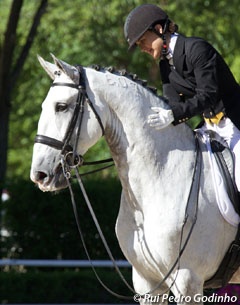
Quite often we get frustrated at ourselves or our progress simply because of our own expectations. We ride out onto the arena thinking we have to ride perfectly and our horse must go as well as he did yesterday; do the half pass as well as he can possibly do. We inevitably get disappointed. This leads to frustration and frustration leads to a lack of patience. We all know a lack of patience leads to an unhappy horse.
Mindset is one of the fundamentals of dressage and just as important as it is to be able to leave outside influences out of the arena, it is also important to enter the arena with realistic expectations as well as a number one rule in your mind: If I can’t get A, do not under any circumstances ask for B!
This is referring to -- and we see it a lot -- when a rider comes out and does a very average walk to canter and two circles later they are attempting a flying change. They then get frustrated at the horse because the change was late, so they keep doing flying changes until the horse learns to resent the flying change and the rider is depressed. It happens in all aspects of training,and the only thing to always remember is keep it simple!
Why do riders trot off when the walk is stiff and not going forward? Why do riders ask a half pass when the horse is still only doing shoulder-in to one side and not the other? Frustration usually occurs because we forget just how important and how difficult the simple things are. We forget to reward them properly and I mean reward not just our horse but also ourselves!
We can so easily overlook the simple things, the things that should be reinforced, and rewarded, every day. There cannot be more stress put on the ability of the rider to reward the smallest success and, furthermore, the ability to set goals that will lead to reward, and not frustration. If you ride out onto the arena and feel that your horse is a little stiff, or not quite straight, then the entire lesson might be focused on helping him to relieve that tension. Keeping it simple helps you to also respect the horse's body.
I was watching a very talented rider recently who turned to me and said, “the horse will do everything you want it to, if you respect it’s body." I thought about this and considered it in terms of our own bodies. If we wake up stiff and someone tells us to go for a sprint, do we feel happy about that? Wouldn’t we appreciate if we were first given the chance to really loosen up and build the necessary strength?
What if our horse gets out onto the arena, and he slept in a funny position, was cramped in the box, or had a gallop in the paddock, and has a cramp in his neck. The rider feels that he is stiff, but rides on. Then the horse starts to spook and be naughty and the rider pushes more, thinking the horse is misbehaving instead of considering that maybe he is trying to tell them something! Then they ask a half pass, and the horse obligingly but painfully moves himself across the arena, and the rider keeps pushing. If this happens one day you have a cranky horse and a frustrated rider. If this happens everyday you have a lame horse and a very unhappy rider!
Respecting the horse's body means feeling what is happening; feeling where the weight is going and working to correct these imbalances. Wait until your horse feels loose and free before you ask more of him.
Nuno Oliveira used to say that the “horse must be straight but flexible rather than rigid, and as supple in the bend left as in the bend right.” And this rule is the single most important thing to keep in mind every time you go out onto the arena.
Nuno added that “we must make an effort to have perhaps less technique and more feeling”, so next time you are frustrated, or are having trouble, reconsider your expectations: keep it simple, feel and respect your horse's body, and he will thank you later.
by Sarah Warne - Photo © Rui Pedro Godinho